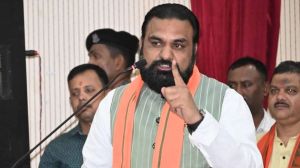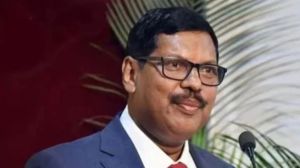Internal disputes affect morale of Army, says George
Defence Minister George Fernandes on Sunday said that while the borders were secure in the hands of the armed forces, internal disturbances ...

Defence Minister George Fernandes on Sunday said that while the borders were secure in the hands of the armed forces, internal disturbances posed a major challenge not only to the morale of the forces but also to the well-being of the country, making it vulnerable to the designs of terrorists.
Speaking at the concluding session of the 15th National Congress for Defence Studies organised by the Central Hindu Military Education Society’s Bhonsala Military College, Fernandes warned against the use of armed forces during communal riots, internal disturbances and natural calamities.
Fernandes emphasised that the armed forces were trained to fight external adversaries on the borders and not their own countrymen. Another adverse fallout was the rift created between the armed personnel and the general public. ‘‘Don’t think that because the men in uniform don’t say anything, they don’t think about it’’ he said, pointing out that some of them had asked, ‘‘What are we dying for?’’
The minister pointed out that in other countries, there were separate organisations to tackle internal disturbances and natural calamities. The country, however, had never thought of independent crises management even after it became free and despite regular internal disturbances and natural calamities. Fernandes felt the country’s internal divisions had made it weak and the situation had not changed after Independence. He said whenever the country had fallen prey to invaders, it was only because of internal squabbles. In turn, he advocated introspection so that alert neighbours would take care of each other and not allow petty differences to create a rift between them. ‘‘History has not forgiven our ancestors,’’ he said, ‘‘and history will not forgive us.’’
The real challenge, he believed, was combating internal problems, strengthening the economy and tackling unemployment. Fernandes pointed out that in August last year, 4.27 crore unemployed persons had registered with the employment exchanges in the country and if illiterates and those in the unorganised sectors were included, the number of unemployed would be twice that figure. He also criticised the obssession for government jobs and the tendency for not maximising one’s output. He explained that in his South Block office, employees played cards in the open during winter, while their counterparts in the forces worked regularly. All this affects the morale of the men in uniform. He said merely equipping a soldier with the latest gadgets and weapons was insufficient, the nation’s character acts as the motivating factor. He had visited Siachen 26 times and would continue to do so to boost the morale of the soldiers who brave temperatures as low as minus 50 degrees. Fernandes launched a scathing attack on the media for talking about the effect on the morale of the armed forces after the pullout from the borders began. He believed that by talking about it, the media had hit the morale of the armed forces. He also blamed the media for talking about intelligence failures, everytime an incident took place. He wondered how the intelligence services could be held responsible if a person on a suicide mission kills others.
He assured that the borders were secure at the hands of the armed forces and that post-1998 care was being taken to provide funds and equipment to the forces. The two indigenously manufactured Light Combat Aircraft would stage demonstrations at the airshow to be held in New Delhi in February 2003. Fernandes added that the Hindustan Aeronautics Ltd had made an intermediate jet trainer which would also be exhibited at the show apart from advanced light helicopters.



- 01
- 02
- 03
- 04
- 05




























